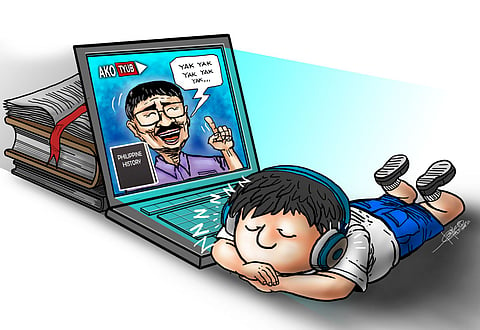
- NEWS
- the EDIT
- COMMENTARY
- BUSINESS
- LIFE
- SHOW
- ACTION
- GLOBAL GOALS
- SNAPS
- DYARYO TIRADA
- MORE

There's a move in the House of Representatives to increase the P710.6-billion proposed budget of the Department of Education in 2023 under the National Expenditure Program submitted by the Executive Department to Congress.
But the sought for increase is nowhere near the original proposal of DepEd to have a budget of P848 billion for next year as it tries to oversee a "safe return" to face-to-face classes of elementary and high school students nationwide.
To recall, the Department of Budget and Management slashed DepEd's proposed budget to P710.6 billion, noting that the amount already represents a lion's share of government allocations and is P77.3 billion more than the DepEd's P633.3 billion budget for 2022.
Earlier, DepEd spokesperson Michael Poa said the department, headed by Vice President Sara Z. Duterte, would state their case for an even bigger budget than what DBM requested when lawmakers start looking at the expenditure programs of each department item by item, line by line.
That time is now, as a senior House leader has proposed to increase DepEd's P5.91 billion budget for the construction of 2,379 new classrooms. The increase would be intended to end a de facto 16-year moratorium on the building of school libraries, according to the lawmaker.
The last time a budget for building libraries made it to the GAA was in 2006 to the tune of P120 million for the establishment of 12 major learning resource centers and 60 library hubs, added the congressman.
At the core of the proposal was the assumption that the lack of government funding for school libraries has contributed to the Philippines placing at the very bottom of the heap of 79 nations when it comes to reading comprehension.
While the study conducted by the Program for International Student Assessment by the Organization for Economic Cooperation and Development was carried out in 2018, its findings cannot be considered to be dated coming as they did before the pandemic during which students were limited to online studies for over two years.
Further, a World Bank report said that 45 countries in Asia and Europe closed their schools at the peak of the pandemic, affecting 185 million students. The remote learning that followed, with both teachers and students unprepared for online instructions, brought down the quality of education, WB said.
Local educators, meanwhile, have lamented that the Philippines' budget for education has always hovered at about three percent of its gross domestic product when the global standard has stood at about six percent.
As things stand, the push to fund the construction of more school libraries had the premise that providing well-stocked learning centers to students would rekindle the interest of young Filipinos to read books, print or electronic, with the hope that with renewed interest in the printed word would also resort to better comprehension among the young. That may be a non sequitur.
The problem may have arisen with lifestyle changes forced on people and not just on the young by ever-evolving technologies that have cut short attention span and have made reading, even for the fun of it, seemed to be a waste of time for the majority of people hooked on short-form videos and bite-size social media posts.
Truly, educators are fighting a losing battle in making people say, "Stop this world from turning, I'm going to read a book." As reading, the way past generations have known it, continues to lose its hold, comprehension or the lack thereof would naturally follow. This phenomenon is partly to blame for why YouTube "explainer" videos have become so popular, or why "influencers" abound.
Many people today cannot be bothered to read or to comprehend as they'd rather have other people do the thinking for them.
